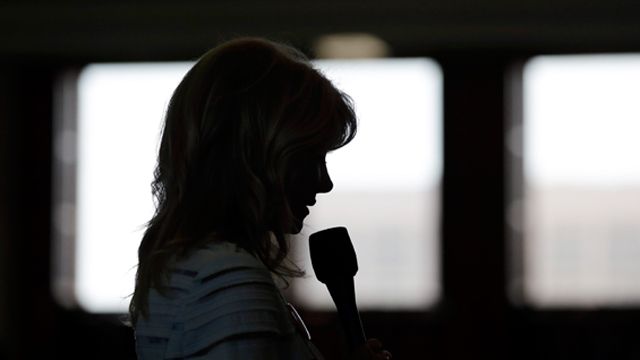
This post first appeared on RH Realty Check on November 5, 2013.
In the dog days of summer, the “war on women” erupted into a full-fledged conflagration, as heated battles to roll back reproductive rights in the US Congress and in state legislatures across the nation were met with protests from women’s rights groups and grassroots uprisings. While the religious right had, over the years, used its influence to restrict access to abortion and contraception and push for feticide and personhood laws, nothing quite like the anti-choice legislative frenzy seen this past summer had taken place before the Koch brothers entered the war, bringing reinforcements from their legion of wealthy associates.
In June, outside the Ohio capitol building in Columbus, for example, hundreds gathered on the lawn to protest anti-choice measures that were ultimately slipped into the annual budget bill, HB 59.
In North Carolina, thousands of activists gathered weekly, throughout the legislative session, at the state capitol in Raleigh for Moral Monday protests of a host of right-wing measures ranging from voter ID laws to rollbacks of reproductive rights. Many were arrested for trying to enter the capitol building.
And in Texas, the state capitol building in Austin was crammed with protesters as state Sen. Wendy Davis (D-Fort Worth) earned her place in Lone Star history with her 11-hour filibuster of a draconian anti-choice bill, SB 5, which, after being stopped by Davis and her pro-choice allies with a dramatic run-down of the clock, ultimately passed into law as HB 2 in a subsequent special session called by Republican Gov. Rick Perry.
Back in Washington, DC, the Republican-controlled House of Representatives passed HR 1797, a bill that would ban abortion after 20 weeks post-conception.
To the untrained eye, it seemed that a sudden wildfire of anti-choice bills had engulfed the legislative agenda, but in truth the assault had been years, even decades, in the making. It wasn’t until three years ago, however, that conditions became so hospitable for the arsonists who trained their flame-throwers on these fundamental freedoms.
In 2010, three key events created the incendiary political landscape that fueled this summer’s inferno: the Supreme Court’s decision to strike down campaign finance restrictions in Citizens United v. Federal Election Commission, elections at the state and federal levels that rode the winds of backlash against the 2008 election of Barack Obama and the subsequent census-year victories of right-wing Republicans whose gains in state legislatures and governors’ mansions gave them control of the process for drawing legislative and congressional districts.
There is little doubt that the rash of anti-choice measures that flooded the legislative dockets in state capitols in 2013 was a coordinated effort by anti-choice groups and major right-wing donors lurking anonymously behind the facades of the non-profit “social welfare” organizations unleashed to tear up the political landscape, thanks to the high court’s decision in Citizens United.
While similarly classified groups exist in progressive circles, they have nowhere near the funding provided to right-wing groups by wealthy, business-focused donors. Of the top-ten outside spending “social welfare” groups engaged in the 2012 elections, all but one were either right-wing or conservative.
Helping to drive the right-wing offensive in the states and in Congress is a network of deep-pocketed business titans convened by the billionaire brothers Charles and David Koch, principals in Koch Industries, the second-largest privately held corporation in the United States. Like the Kochs themselves, many of the donors in the brothers’ networks signal disinterest in fighting against women’s rights or LGBTQ rights, yet anti-choice groups have seen their coffers swell with millions of the network’s dollars.
“If you want to promote a pro-corporate agenda, you’re only going to get so far,” Sue Sturgis, the Durham, North Carolina-based editorial director of the progressive website Facing South, told RH Reality Check. “But when you start weaving in these social issues like abortion and other reproductive rights issues, then you’re gonna appeal to a broader range of people, and a very motivated voting bloc. They will turn out. So it serves your larger cause.”
The Koch Connection
RH Reality Check’s review of tax records filed by the Center to Protect Patient Rights (CPPR), taken together with a Politico report on the tax records of Freedom Partners, show these so-called free-market organizations, both linked to the Koch brothers, dispensing tens of millions of dollars to groups whose mission it is to end reproductive rights. CPPR was founded in 2009, and is described by the Los Angeles Times as “a primary conduit for anonymous political money in the 2010 midterm [congressional] election.” Freedom Partners was founded two years later, just in time to help shape the landscape of the 2012 presidential, congressional and legislative races.
Through the creation of non-profit organizations under sections 501(c)(4) and 501(c)(6) of the tax code, the Kochs and other political money-wranglers concocted several layers of obfuscation for their well-heeled friends to hide behind. The tax code protects groups in those categories from having to reveal their donors.
By its name, you might take the Koch-linked CPPR — now apparently defunct, according to the nonpartisan Center for Responsive Politics — as yet another astroturf group launched to oppose Obamacare. Run by longtime Koch political operative Sean Noble, CPPR was indeed that, but it was much, much more. Known in political parlance as a pass-through group, CPPR was used by big, unnamed donors to pass money to other organizations, apparently as a means of further obscuring the original source of the funding.
RH Reality Check, examining CPPR’s tax filings, confirmed reporting by NARAL Pro-Choice America and American Bridge that in 2010, it granted more than $1 million to the Susan B. Anthony (SBA) List, about half of the $2 million the group spent that year on advertising for anti-choice candidates and against pro-choice candidates in state and federal races across the country. The CPPR grant accounted for nearly 15 percent of the group’s overall revenues that year.


